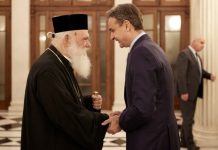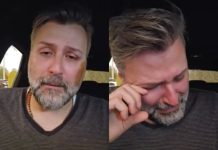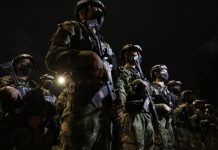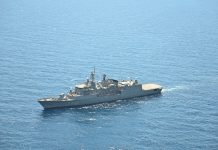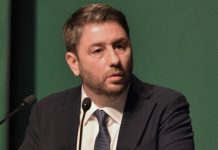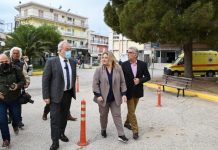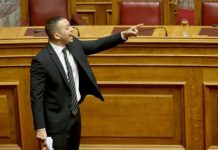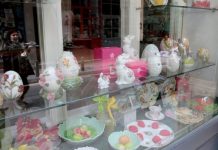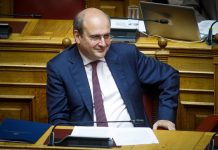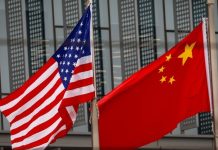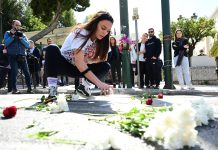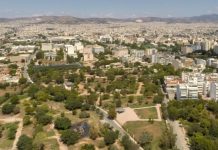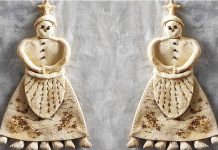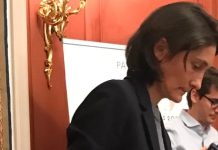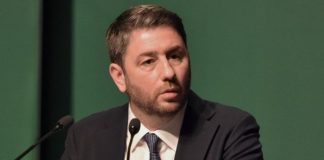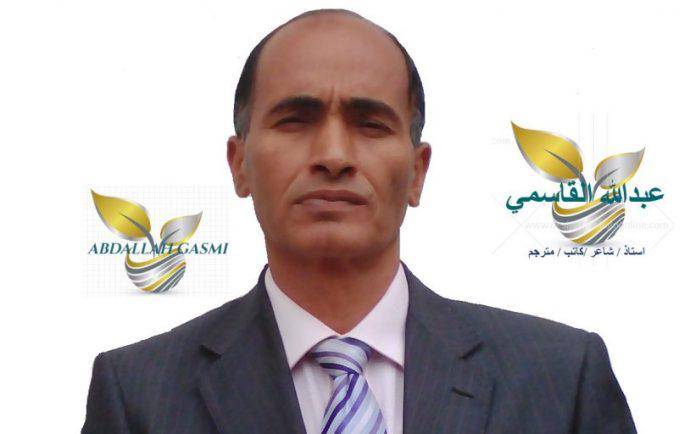
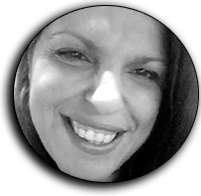
lenakyropoulos@gmail.com
Today, PERSONALITIES will guide us to the hidden world of poetry. What can we find behind the words? What are our expectations? What is poetry all about and why is so important for human beings. All the answers are here and our guest is the famous poet Abdallah Gasmi. He is going to explain us his path and all the beautiness behind his collaboration with two great Greek Ladies, Mrs Katerina Mpatalia and the writer Eva -Lianou- Petropoulou who brought him in Greece! ABDALLAH GASMI was born in Beni Khalad, governorate of Nabeul, Tunisia, on 21 September 1967. He is an academic higher in the Faculty of Arts in Manouba, including obtain a professorship in the Arabic language and literature and then a master’s.He is a professor at the Tunisian secondary institutes and the press. He was a member of the governing body of the Tunisian Writers Union in charge of branches and clubs and resigned in 2013. He is also General Secretary of the General Union of Tunis Writers (under establishment). He is the owner of the Tunisian newspaper Al Diar and is currently its editor. Times of color and body/ Light ports/– Cities of grief/-Narcissus and Jasmine Grove/-Arabic poet hallucinations. Tunisian Odyssey/– has a critical book entitled “Rhetoric of the linguistic object”/-he has a manuscript book entitled “Years of Arab Ache”/– he has a manuscript novel entitled “The Cadres”/– A number of stories/– and some other poetic manuscripts/-his play entitled “Whirlpool” represented by the Algerian artist Sonia and directed by Iraqi director “Salam al-Sukr” and won many awards. I am so glad to have an interview with the Tunisian poet Abdallah Gasmi who is coming in Athens in 4/08/2020.
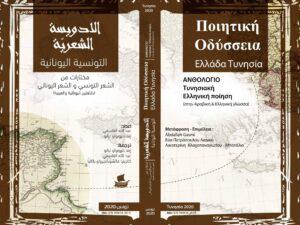
What is poetry? When you hear this word in different language, are you smilig? Can we say especially nowadays that it is the medicine, the cure of our soul for its influential character? Do we act as biological objects towards it? Is there confusion?
– I want to say that the question is confusing, as poetry no longer has a single concept by which we can define poetry, but poetry has multiple concepts, each poet has a vision and concept of poetry and the concept usually relates to the function of poetry, so I will present my definition of poetry as a form of residence on the ground i.e. reside sing in the universe in a poetic way, poetry is those simple details that the rest of the speeches are unable to capture, it is the speech of the soul, its groaning, its joy and its eagerness to dream, it is these brokenness and disappointments, and it is the desire to embrace the absolute, the absolute love, the absolute happiness, it is flying with language in the language, poetry is a capture of the minor details in our lives, the poet’s job is no longer to answer cosmic questions, and make alternatives.
The function of poetry is to capture the details in a person’s life and express them emotionally, as the poet is a conscience of humanity, expresses by his language on victories and disappointments and makes a dream, poetry deals with issues that science and other speeches fail to capture, so expressing feelings of love and feelings of sadness fails the scientific discourse or the politician to express it.
Poetry carries you to precise words in the human soul, so poetry with the cave man was found and continued in the era of the atom and the conquest of space and will continue in the coming ages.
The function of poetry did not change, but the life of a person changed. Before years, the poet expressed about the feelings of a person and his dreams, and the poet was the voice that expressed the collective self and he wrote about his people and his refractions, and he is still expressing the insides of man, his dreams and the nation. Poetry is still a medicine for the human soul, we all live poetic moments in our lives, we all walk with love, we all long for love, we all dream, we all suffer, we all grieve, we all want to escape from our reality, these feelings, dreams, those shy whispers that the lover says to his sweetheart. It is poetry, and we all without exception live these moments. The difference between the poet and the ordinary person is the poet’s ability to capture those moments with their simple detailing, writing and directing them as an artistic outlet, and they are common details for everyone, so when the poet expresses feelings, he express himself. For man in general, therefore, poetry will remain a treatment for the soul, because whoever lives without dream and love is really sick, so the hair will still be present as long as the person is present. When I hear the word poetry in different languages, I do not smile but confuse, I am familiar with international poetry and find that poetry is poetry in all languages and in all civilizations, writing styles may differ but the function of poetry is the same. I am Arabic, but I find myself in Greek and French poetry and others I feel those poetry have expressed my dream and myself.
Charlie Chaplin used to say the following: I laugh so as not to cry. Do poets do the same? Is their anxious creation a form of revolution?
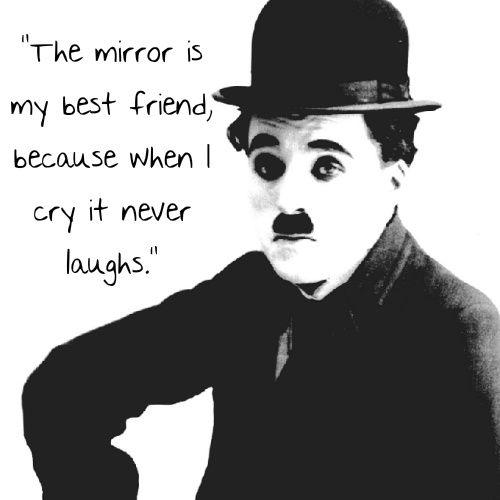
– The poet can say, “I write until I don’t die”. Writing is a daily practice that resists nothingness and annihilation. In my opinion, the poet’s job is to write a dream and teach people how to dream, and if dream does not exist, everything is lost, love and joy are transformed, and life turns Humanity to a dark area, because reality has many coercions and dream is the only way that can make us resist darkness, the poet is a dreamer by nature, but sometimes he is separated from reality and sits in his dreams kingdom, and from here comes anxiety, anxiety is a paradoxical result in the depths of the poet. Between the object and the possible, between the existing and the desired, the poet seeks to a world of values, love, beauty and dream, but he looks around it and sees only ruin and calls for killing and hatred and becomes disappointed and realizes the absurdity of things around him, rejects everything, rejects the systems and he announces the revolution, and from there is a feeling of anxiety in addition to another anxiety that is technical anxiety.
The poet is in conflict with the language trying to volunteer it, but she refuses, so he remains in conflict with her. Poetry, like the rest of the arts, is a journey of endless questions, questioning reality, questioning self, questioning language, these questions make the poet self uneasy, anxious, and the anxiety appearance by poets is really a revolution and rebellion.
Civilization from person to person transmits the inner light and brings to the surface noble alloys of patience, perseverance and so on. What kind of metals has the verbal hoe of your soul made?
Yes, of course, man is the outcome of history and civilizations that have passed. I am from Tunisia and it is a country that has known human civilization for more than 10 thousand years. Civilizations followed, and Tunisia was a meeting place for Mediterranean civilizations: Berbers and Carthaginians to the Romans, Arabs, Turks, Spaniards and French along with other civilizations, as we were open to the rest of the Mediterranean civilizations that existed in Tunisia, all of this made us a people open to the other and those civilizations have left great influences, the effects of which are still affecting our behavior and our custom until today.
All these civilizations fused to give the Tunisian person today, I consider myself an heir to those civilizations that one day passed from our land and left traces. Also, this cultural richness facilitated my integration into the cosmic system. When I read a national history, I open the book of the history of the Mediterranean. Even in our daily dealing language in Tunisia, you will find singularities from the Mediterranean languages, such as French, Italian, and others. All fusion born in me is deep. It is the depth of the Mediterranean civilization.
How did you feel the first time someone called you a poet?
I remember that moment very well, at that time I felt a mysterious tremor and I felt myself flying, especially since my teacher called me to it when I was studying in my fifth primary school. My father had great merit in my upbringing. As my father was a simple employee but he was eager to read, he owned a lot of books, and he was able to read with a high voice. I remember how much I used to enjoy to hear him reading. I watched all this books and my curiosity became bigger and bigger. So, I learned to read and to imitate him and after many other poets. I was so happy that found my tendency to read poetry, and I was taking those attempts for my teacher who was reading and encouraging me, to call me one day with the word poet, it was an unforgettable moment. I visited many countries and attended hundreds of gatherings, but I did not feel the value of the word as it did that day.
Let’s go to have a nice music break with a beautiful tunisian song, which speaks about justice
Where do you get your inspiration from?
I love nature very much, and I love the sea. I live close to the sea, so I spend hours there, sit on a rock in the beach, look at the poetry in front of me in successive waves, look at the sunlight breaking on its surface, I see in it the human self in its reactivity and calmness. I see beauty and anger, I see light hugging water. The sea is just like us sad, happy, angry, when you merge with it, it will tell you about the first two. It has multiple stories that are renewed every moment.
Even at night, I go to the sea and sit around accustomed to, I hear new stories whispering in my ears, I feel the calmness and the strike, I follow the steps in a life dance between love and dream. On the horizon, I see a hug between sea and the sky. I see the hair of the night…I smell the loneliness, the hope, the sun. Most of my poems were written by the seaside. It is the source of inspiration, of course, along with those simple details in our lives, those that poets highlight.
I am Tunisian…. that means?
Tunisia is a strategic location, it is at the top of North Africa, and it is the gateway to Africa, and Tunisia is the one that gave the African continent its name, so Tunisia in the Roman era was its name Africa, and it carried this name to the Middle Ages before some invaders changed it. This indicates that we were the gateway to a continent, and it indicates that many civilizations have established our land, so we were open to the civilizations of the Mediterranean, and Tunisia was rich in its heritage, civilization and culture, which made the second country that presented personalities that served humanity, of course after your country, Greece.
We are a people who love life, love poetry. In Tunisia, I found the first trade union movement in Africa, and the first human rights movement, and we were the first country to abolish slavery by government order, before ancient countries. We are now the only democratic country in the Arab region, and I mean true democracy. Just as the world is witnessing that the Tunisian revolution represented an exception in the Arab region, we did not go into chaos and prove that we are an educated people.
We are a people who loves art and life, and we are open to other peoples and other cultures.
When all this beautiful bilateral cooperation started, between Tunisia and Greece, Greece and Tunisia … Did you think that at some point you would travel to Greece? After all, what makes people dare? Next step of your collaboration? What does this mean, both for the Tunisian creators and for the Greeks?
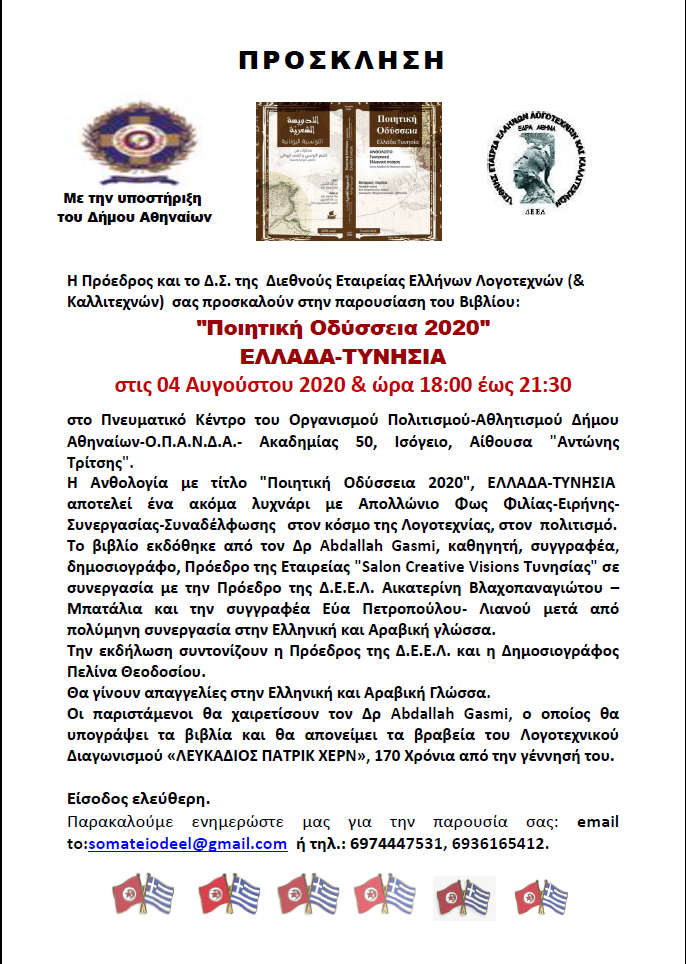
– Greece is a country with great civilization, and I was aware of its culture and civilization, at least through my academic training. I studied Mythology, as well as philosophy and I wanted to visit it, and I assure you that I was thinking of visiting Greece just as a tourist, but life have had different plans.
Cooperation with Greece has a special flavor for many reasons, the most important of which is that Greece is the country of art and culture and has international literary symbols, as well as the advancement of Greek poets and their seriousness in cooperation, and it is truly a dream come true.
In fact, our cooperation was not for personal reasons, but rather as an embodiment of a conviction shared by Ms. Batalia and Miss Eva, we believe that literature and poetry but rather arts are a means of rapprochement between peoples, we believe that art and poetry can make an invitation to love and peace, we work for the sake of a human world in which love, peace and respect prevail, and we work on human cultural rapprochement, so we expect that this cooperation will establish greater cooperation that may include larger areas.
And our cooperation will continue and be strengthened, there will be other books, reciprocal visits, and various cultural activities. It is an opportunity to bring the Greek and Tunisian peoples closer by introducing their culture, and our cooperation will be a model of human cultural cooperation. We need such cooperation, to spread love and the dream.
Covid-19/2020. We have the opportunity to meet ourselves. Were you scared, did you put it on your feet or did you talk? What did all this teach you?
I was not afraid of death, but I was suffering. I was suffering for humanity, a small virus broke our egos, and confirmed that human achievements are trivial, we have advanced in many fields, we have prepared military arsenals, intercontinental missiles, invaded space, we have made terrific scientific achievements. But we forgot ourselves in the middle of all this, we learned to make death tools and did not think about making life tools.
This virus, which does not see, destroyed the health systems of countries that we believed were indomitable. He has assured us that human health is our last concern. It hurts me that countries spend billions on armament and lack a recovery family. It pains me to see countries boasting of their technological achievements and unable to conduct analyzes. For people, this virus has underlined the falsehood of the values upon which our civilization was based, so we are called upon to self-review, to a general review of priorities, a review in which we make the human being the most important component
Nowadays, more than ever we live with digital media, which also support the project of promoting our writing activity. But do you feel that we have lost control? The Screen is slowly and steadily replacing thought, emotion and the senses. How do you feel about that? 2060 … How do you imagine the poets in the future and how much will the cooperation between you have been strengthened?
The digital media has had a great impact on the global literary scene today, and the digital space has become the alternative space in the absence of cultural institutions or their inaction in carrying out their role, and this phenomenon had two manifestations. A negative aspect, where the writing event has become a banal event, where you find pages on social media sites for names claiming writing and fame without actually having them, and social relations contributed to a further deterioration of literature where comments and signs of admiration abound, for trivial texts and this is an effect on the general taste.
The second aspect is positive, as digital media represented a means of communication between the creators in the world and the world became a small village, and those media contributed to introducing us to distinctive literary experiences. Personally, I benefited from digital media. Through them, I got to know many poets of the world, and I was able to keep pace with international poetic experiences, and I was able to participate in a lot of international literary festivals, and I also developed many international poetic ontologies, and through them my poems translated and they have published books in a number of countries.
I have a poetry site in which nearly 5,000 poets from the world have published, where there are about 20 thousand poems, so it has become closer to a cosmic blog of poetry, and it is witnessing a respectable number of visits, which confirms to me that poetry still retains its luster. Poetry was found in the age of caves, and continue in the era of corn, and it will continue in the coming ages, and it will end at the end of man. So I am optimistic, I think poets will find the best way to deal with technological and digital development.
You have the opportunity to meet yourself back in time like a teenager, … what do you tell him / her? What advice would you give to your younger self?
Ha-ha-ha-ha-ha-ha .. It is a beautiful question. I will not tell him anything, because I feel that I have not grown up and am still a teenager. I still commit some beautiful follies, and behave like a teenager, so the poet remains a teenager until he dies, because the poet if he feels that he has lost the joy of life and lost the rally, the crowds and the rebellion he lost everything, and he should stop writing. Therefore, I will not say anything. I do what I want and sometimes as a teenager.
How we say thank you in Arabic language ?
اقول شكرا
شكرا لليونان ، و شكرا للشعب اليوناني
شكرا للجمعية الدولية للكتاب و الفنانين باليونان
شكرا للسيدة باتاليا و للانسة ايفا ، و شكر جزيلا لك ،، شكرا لخذا الحوار الجميل ،،
Thank you so much and we wish you the best luck ever!!!
Lena Kyropoulos and Personalities Team


